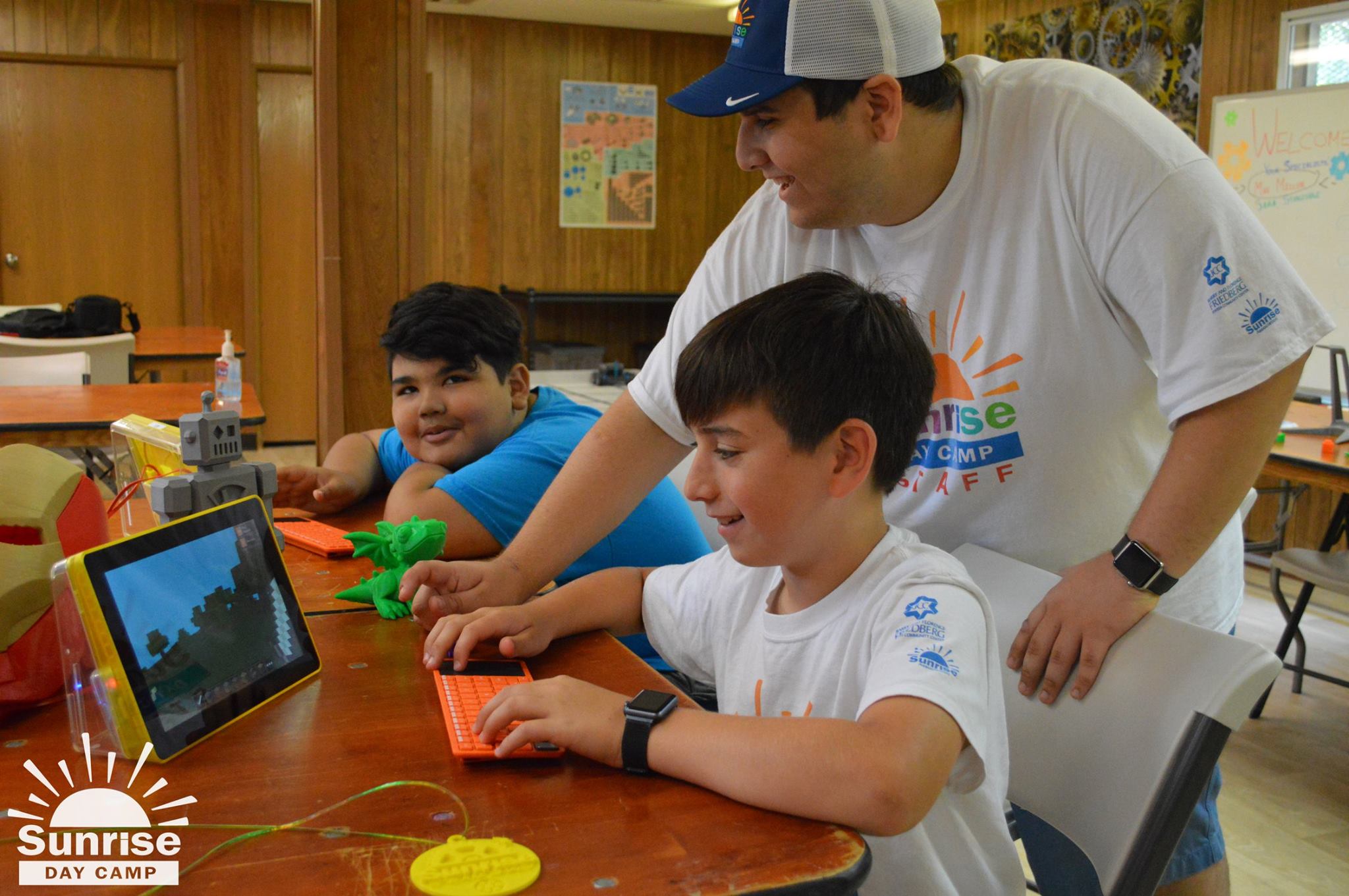After Max Miller’s childhood friend was diagnosed with leukemia when they were 6 years old, Sunrise Day Camp in Wheatley Heights became an important part of the Millers’ lives.
When Max was 16, he got one of the camp’s coveted counselor positions working with the 9-year-old boys at the country’s only free day camp for children diagnosed with cancer and their siblings.
The captain of Friends Academy’s robotics team in Locust Valley, Max has always shown an interest in technology and quickly learned so did some of his campers.
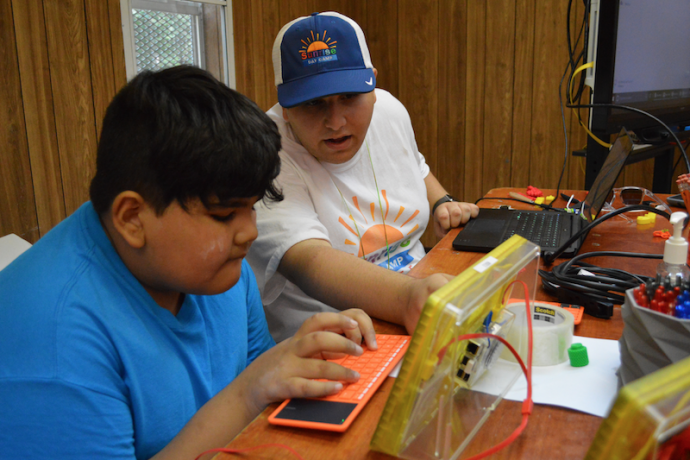
“On one of my first days last year, I was off to the side of the basketball court and one of the campers was talking to me about my school’s robotics team and how I learned 14 coding languages,” Max said. “He said he wished the camp had a computer lab so I could teach him how to code.”
From there, Max, who lives in Roslyn, began planning the new Sunrise STEAM Shack — covering science, technology, engineering, art and math — and went to camp director Deanna Slade with a pitch. The project was not in the camp’s budget, Slade said, but she welcomed the enthusiasm and told Max they would incorporate it into camp if he could find the funding to build it.
A year later, a donated temporary trailer sits on the Henry Kaufmann Campground in Wheatley Heights until a permanent structure opens next summer thanks to the $300,000 Max has raised in less than a year.
Last November, Max met with the Laura Rosenberg Foundation’s advisory board to offer a demonstration of what the new classroom could do for the campers.
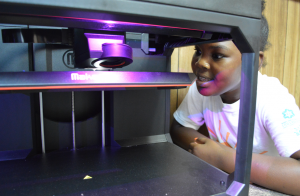
Max said he showed trustees that he could operate his 3-D printer remotely from a raspberry pi, a series of small single-board computers for $35 developed to promote teaching basic computer science, via a live steam from his house.
Within two days, the foundation called Max’s father, David Miller, a board member of the Sunrise Association, which raises funds for the camp, and Friends of Sunrise chairman, with a $150,000 donation to get Max’s project rolling.
From there, the donations of both money and services started rolling in.
“We’re global now with three camps in Israel, but I would say 80 percent of our fundraising happens in a 15-mile circle around Roslyn,” David Miller said. “All of the key people who have been involved from the beginning are locals.”
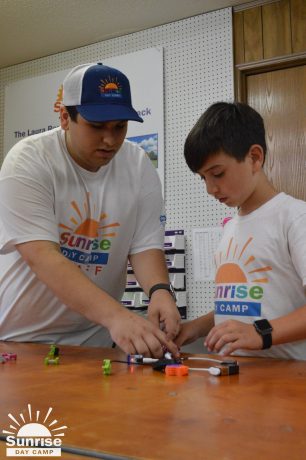
One of the biggest missing elements for the STEAM Shack was the availability of high-speed internet connections to run some of the technology. After David Miller called Verizon, he learned the project would cost about $50,000.
However, after a few months of working with Verizon, the company offered to provide the underground wiring free and recently sent a team to the camp to begin work.
SUNation Solar of Ronkonkoma has offered to cover the roof with solar panels, David Miller said. Atelier New York Architecture of Long Island City is also doing all of the architecture for the new facility.
“Everyone is chipping in,” he said. “All of these companies have partnered with us in the last nine months. It’s overwhelming the support this has garnered. I think the idea just registers with people.”
For Max, the project isn’t solely based on an interest but a need for the campers, who often miss school days while dealing with treatment and recovery.
“Eighty percent of kids with cancer get cured, it’s thankfully a very high cure rate, but almost all of them, 100 percent, fall behind in school,” Max said.
The camp is already divided into two types of daily activities, low energy and high energy, so the STEAM Shack gave campers another option for something to do out of the heat while learning crucial skills missed in class.
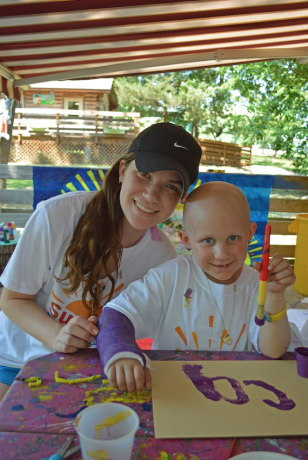
“A lot of people there had a sense that this was something from an education standpoint,” David Miller said. “STEM is the future; all jobs are going there. Everything is manufactured through 3-D printing.”
Max said the campers use littleBits, a connectable chain of Lego-like electronic nodes that, when connected, can light up, play sounds or move around, as well as Vex IQ robotics construction kits and MakerBot 3-D printers.
Max’s favorite part of the curriculum, however, is the Kano. Designed by a London company, the kit includes everything to build a small computer from a raspberry pi that teaches the user how to write computer codes. The small, colorful device combines engineering and technology to give campers the full experience of both building and programming.
David Miller said they are also working on a lot of digital art projects and got a wide-format printer to turn their projects from virtual reality into a physical one.
During the off-season, he said, the portable devices will be incorporated into the camp’s hospital program, traveling from one oncology ward to another giving children distractions during treatments.
Sunrise Day Camp’s vice president of marketing, Judy Fishkind, said the new facility is a wonderful addition.
“This is where they feel normal,” Fishkind said. “If you’re bald, no one’s going to ask you what’s going on. You walk around here, and this is like every other camp, and that’s what we wanted.”
To donate to Max’s project, visit the STEAM Shack’s crowdfunding site. Donations to the camp directly can be made through the Sunrise Association.

